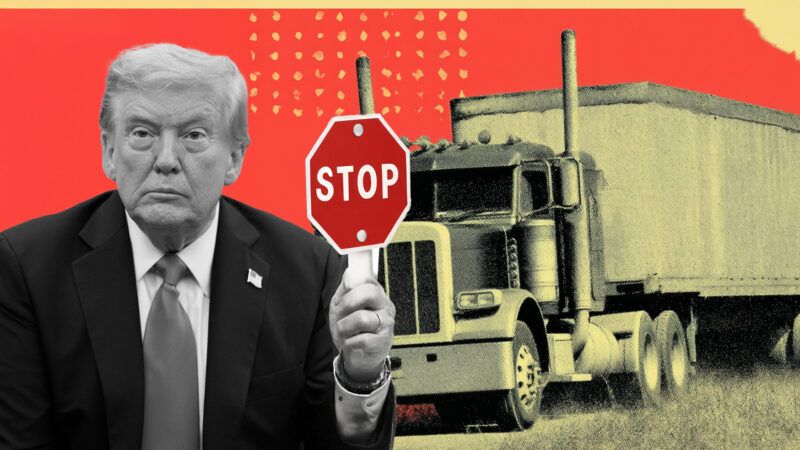Trump's Tariffs and Immigration Policies Are Why Your Amazon Packages Are So Expensive and Will Take Forever
I got a pair of shoes delivered from Asia for a reasonable price. Trump just ended the exemption that makes that transaction possible.

President Donald Trump's tariff regime is making everything from American-made steel weights, imported yarn, and Amazon's "everyday essentials" more expensive while his immigration crackdown is causing worker shortages in key industries. These policies will work in tandem to slow down already expensive deliveries of your favorite goods.
I personally experienced these ill effects when my ASICS Men's Gel-Rocket 11s took 40 days to be delivered from somewhere in Vietnam, Indonesia, China, Japan, or Cambodia, where SourcingWise, a supply chain management company, lists ASICS' manufacturing plants. Under former President Joe Biden, these countries were subjected to relatively low weighted average tariffs rates—4.63 percent, 4.11 percent, 2.86 percent, 1.58 percent, and 7.95 percent in 2022, respectively—but are now subject to reciprocal tariff rates of 20 percent, 19 percent, 30 percent, 15 percent, and 19 percent, respectively. Trump's tariff rates on these countries are at least twice as high as Biden's, and Americans are already feeling the pain.
Luckily for me, the sneakers—which are incredibly comfortable and snazzy—only cost a grand total of $64.95, which means they were covered by the de minimis exemption and spared the logistical challenge of calculating and collecting tariff revenue for Customs and Border Protection. Those shoes—and all other imports under $800—are now subject to tariffs since Trump eliminated the de minimis exemption entirely on Friday. Reason's Eric Boehm reports that the U.K. Royal Mail already halted shipments to the U.S. on Monday "while awaiting more clarity on the new rules for imported parcels. Postal services in Germany, France, Italy, and several other European countries have also suspended shipments to the United States or said they plan to do so."
Once my shoes landed stateside at a warehouse in San Bernardino, California, they only took four days to reach my Arlington, Virginia, address, over 2,500 miles away. The rapidity of this cross-country delivery suggests that American trucking is doing fine. Unfortunately, this anecdote is not representative of the national trend.
As Trump's tariffs make products more expensive, his immigration policies are about to make them take a whole lot longer to reach your home. Last week, Secretary of State Marco Rubio announced that the federal government would cease issuing visas for commercial truck drivers. Rubio claimed "foreign drivers operating large tractor-trailer trucks on U.S. roads is endangering American lives and undercutting the livelihoods of American truckers." His statement follows the killing of three people in New Mexico by an illegal immigrant truck driver from India, Fox News reports.
The crash was tragic, senseless, and the driver has been arrested on allegations of vehicular homicide. But it doesn't justify Rubio's decision to stop issuing visas for truck drivers during a shortage when truck fatalities are lower than they were last year.
The American Trucking Association reported "a shortage of qualified drivers that reached 78,800 in 2022," before increasing to 115,000 in 2025, according to Matrack, a provider of GPS fleet management solutions for the trucking industry. It comes as no surprise, then, that a Tech.co poll from May found that 69 percent of transport and shipping professionals said "driver shortages have limited their ability to meet demand," with another "63 percent saying the ability to recruit and retain drivers has either stalled or worsened over the past year," as reported by Newsweek.
These shortages will have not resulted in domestic truck drivers getting paid less. In fact, Newsweek reports that "56 percent of U.S. freight businesses concerned about staffing retention plan to increase driver compensation." Ending the issuance of visas to immigrant drivers will only exacerbate the shortage's detriment to American consumers.
Apparently, Donald Trump has decided that making imported goods more expensive isn't enough; he's decided to make them take longer to reach their destinations too.
